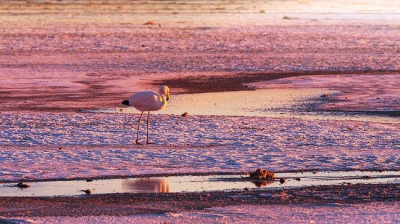Introduction to Biodiversity Informatics Using GBIF
- Parker-Allie, Fatima |
- eLearning, Sanbigbif |

SANBI-GBIF in collaboration with Sol Plaatje University is exploring ways of using biodiversity informatics, the identification of some key tools, techniques and approaches that can be used to ask some pertinent research questions related to time, space and taxonomy.
The contents of the course will include aspects such as the molecular data mobilization, data analytic techniques to manage aspects of data quality like time, space and taxonomy, data visualization, conservation planning and species distribution modelling using deep learning approaches.
Información del curso
Course Topics
- Data types and sources
- Data visualization
- Molecular data mobilization - eDNA
- Species distribution modelling
- Conservation planning
- Science communications
Course Trainers
Fatima Parker-Allie
Ms. Fatima Parker-Allie is a Deputy Director: Biodiversity Informatics & Partnerships at the South African National Biodiversity Institute, she is also the SANBI-GBIF Node Manager focused on making biodiversity data accessible, and advocating that data mobilised meets a sustainable development agenda. Ms. Parker-Allie’s research interests are focused on growing Biodiversity Informatics as a field of science in the country; developing strategies and revolutionary technologies to advance data mobilisation in South Africa, like conveyor belt technologies; investigating the uses of biodiversity data to determine a valuation of FAIR and OPEN data supporting the data-science-policy interface. Here her work is focused on aligning biodiversity informatics to the Science, Technology and Innovation (STI) agenda to support science, policy and decision-making.
Douglas Harebottle
Dr Douglas Harebottle graduated with a Master’s degree in Zoology from UKZN (1994) and a PhD in Zoology from UCT (2012). His areas of research include waterbirds as indicators of wetland health and conservation value, colonial waterbird ecology, citizen science monitoring, bird migration, and climate change impacts on arid zone biodiversity. He has published 21 research articles in peer reviewed journals and contributed chapters to the Red Data Book of Birds of Southern Africa and Large Terrestrial Birds (CAR) Report. He was based at the Animal Demography Unit, UCT from 1999 – 2013 managing CWAC (Coordinated Waterbird Counts) programme and SABAP2 (Second Southern African Bird Atlas Project), and setting up AFRING (African Bird Ringing Scheme). He is currently based in Kimberley where he is the Director of the Sol Plaatje University Risk and Vulnerability Science Centre (soon to be the Centre for Global Change Research), the university’s first research centre which was established in 2021. He has been a Senior Lecturer in the Department of Biological and Agricultural Sciences at Sol Plaatje University from 2016 – 2021 and was the Department’ s first HoD from 2018-2021. He is a standing member of the Northern Cape Coastal Conservation Committee (Provincial Forum chaired by the MEC), Arid Zone Ecology Forum, South African Wetland Society, Steering Committee of IUCN Heron Specialist Group and IUCN Duck Specialist Group, and is past Chairperson of Northern Cape Wetland Forum (2017-2020). He has been involved with projects ranging from Egyptian ancestry of African Sacred Ibis, movements of captive-reared Lesser Flamingos, colonial waterbird mapping, waterbirds as biodiversity indicators, risk assessment for Rock Dove, and numerous avifaunal assessments for renewable energy projects. He is an Associate Editor for Ostrich (Journal of African Ornithology), and African Regional Editor for the Journal of Heron Biology and Conservation. He is an active bird atlas-er and bird ringer.
Minoli Appalasamy
Dr Minoli Appalasamy is a Post Graduate Fellow at Sol Plaatje University (Centre for Global Change: Risk and Vulnerability Science Centre) and SANBI. Her research interests include plant ecophysiology in urban systems, indigenous and alien plant species dynamics, plant taxonomy, biodiveristy informatics, and species distributions in changing climates. Her current focus is on birds species distributions in arid, north-eastern parts of the Northern Cape, particularly drivers and predictions of future expansion.
Ross Stewart
Ross D. Stewart is a researcher in botany and other biodiversity sciences, with a focus on molecular biology, DNA barcoding, and biodiversity informatics. His recent work leverages advanced technologies to address macroecological questions in South Africa, such as using machine learning and citizen scientist data to look at the phenology of South Africa. He is also committed to educating South African biodiversity scientists and expanding biodiversity informatics capacity.
Jonathan Bell
Jonathan Bell is a dedicated GIS analyst with a proven track record in delivering high-quality geospatial solutions for environmental and conservation projects. Currently pursuing his MSc in Zoology at Stellenbosch University, Jonathan brings a strong foundation in GIS, environmental management, and statistical analysis to his work. With nearly a decade of experience in GIS, Jonathan has honed his skills in ArcGIS ArcMap, Spatial Analyst, 3D Analyst, and other ESRI products. He has a deep understanding of spatial and attribute database management and is proficient in automating routine GIS workflows using ModelBuilder and Python. Jonathan is also skilled in using R for statistical analyses and has experience working with various GIS platforms, particularly the ESRI product suite. Throughout his career, Jonathan has applied his GIS expertise to a wide range of projects, including environmental planning, EIA permitting, biodiversity conservation, wildfire risk assessment, and invasive alien species management. He has a particular interest in using GIS to create interactive web applications and reporting dashboards that effectively communicate complex data and analyses. Jonathan's ability to collaborate effectively with cross-functional teams and communicate technical concepts clearly has made him a valuable asset to his previous employers. He has also demonstrated his leadership skills by mentoring junior GIS staff and teaching GIS courses.
Tutores

Parker-Allie, Fatima

eLearning, Sanbigbif
